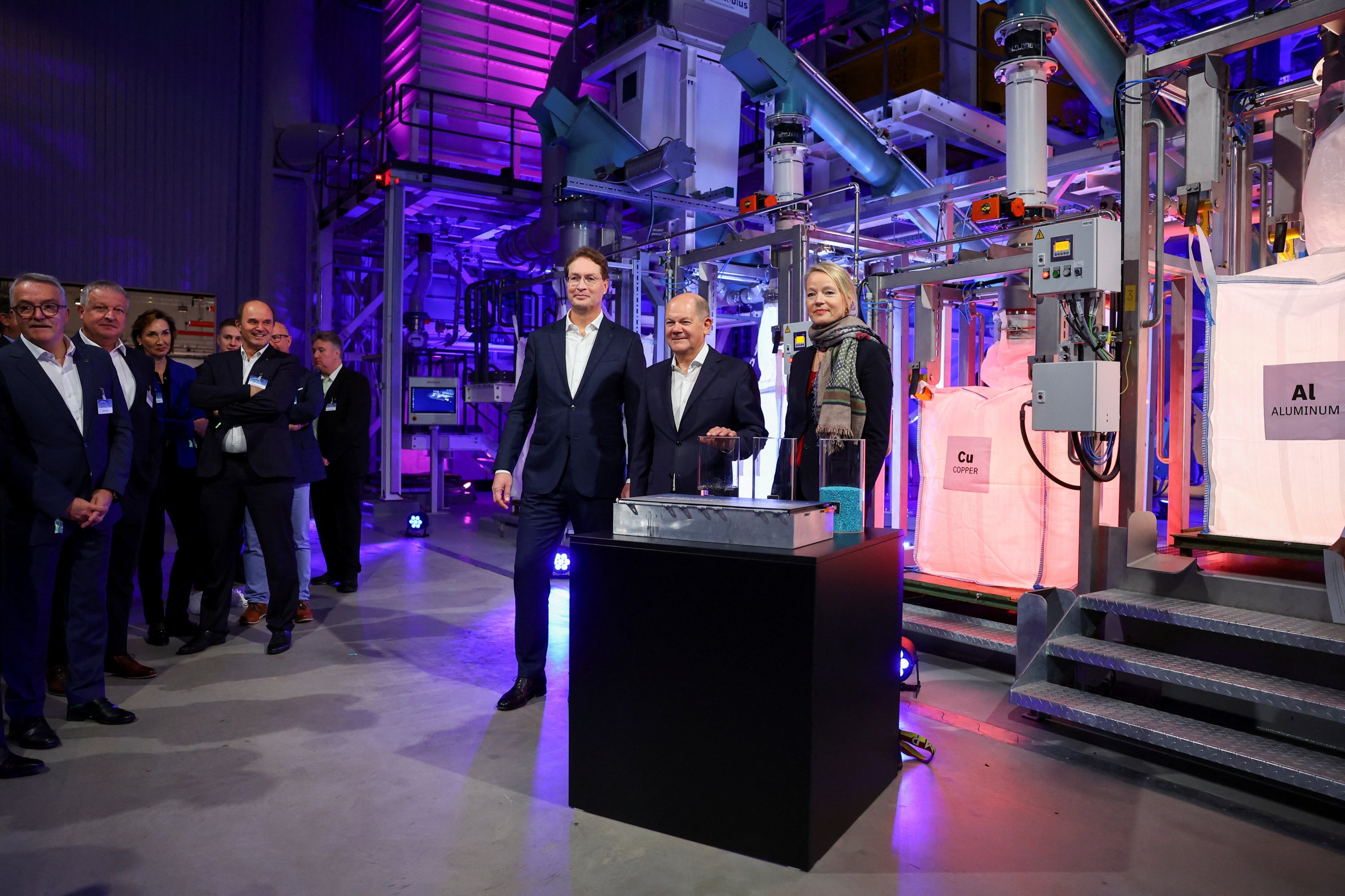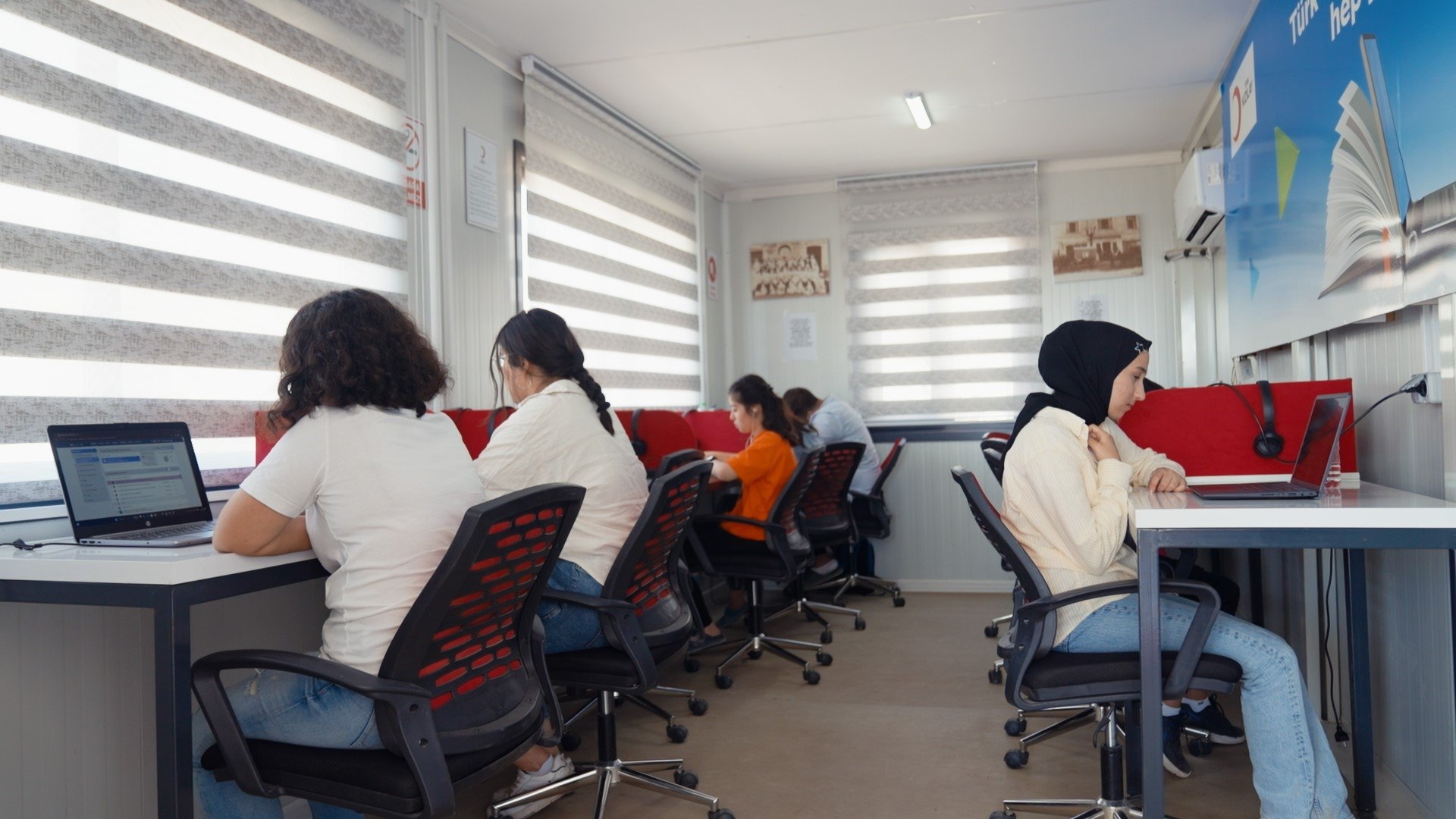The terrorist attack on the state-run aerospace and defense giant Turkish Aerospace Industries on Wednesday is seen as an attempt to strike at the heart of Türkiye’s technology exports and its pool of highly skilled talent.
Armed with assault rifles, a man and a woman on Wednesday set off explosives and opened fire after arriving at the TAI headquarters on the outskirts of Ankara. They killed five people and injured 22 others, according to officials who on Thursday said the two assailants were identified to be members of the PKK terror group.
Türkiye’s largest aerospace manufacturer, Turkish Aerospace Industries, is a key player in developing many critical defense projects, including the nation’s first homegrown fifth-generation fighter jet Kaan and unmanned aerial vehicles.
It designs, manufactures and assembles civilian and military aircraft, helicopters, drones and other defense industry and space systems. Its defense systems have been credited as key to Türkiye gaining an upper hand in its fight against the terror groups.
Türkiye’s defense industry has experienced booming growth over the past two decades, crowned with exports reaching a record $5.5 billion in 2023 – a 27% increase from the previous year.
TAI and other major defense companies are targeted due to their growing share in exports and their investments in human capital, which have even reversed brain drain.
The Turkish Aerospace Industries is known for accepting top university graduates for internships and plays a crucial role in Türkiye’s shift toward a software-focused defense industry.
Export champions
Turkish defense products have an average export value of over $65 per kilogram, reflecting their high-tech nature. Companies like TAI and Roketsan, a pioneering rocket and missile manufacturer, contribute significantly to these outbound shipments.
Known for its drones, Baykar is the top exporter in the industry, having achieved $1.8 billion in sales in 2023.
Overall exports surged 9.8% in value in the first eight months of 2024, reaching more than $3.7 billion, according to official data from the Presidency of Defense Industries (SSB).
Major defense projects
TAI is involved in some of the most crucial defense projects in Türkiye, including the development of unmanned aerial vehicles and unmanned combat aircraft, which are among the country’s flagship defense initiatives.
Notable combat drones like TAI’s Anka, Baykar’s Bayraktar Akıncı and Bayraktar TB2 are in active use for reconnaissance and attack missions, while more advanced platforms such as the next-generation warplane Kaan and Bayraktar Kızılelma unmanned fighter jet are under development.
In naval defense, the MILGEM national ship project is focused on producing national corvettes and frigates, along with efforts to develop submarines and unmanned maritime vehicles.
Multi-purpose amphibious assault ships like TCG Anadolu and intelligence vessels like TCG Ufuk are also part of Türkiye’s efforts to strengthen its naval power.
On land, the Altay main battle tank, armored vehicles like the FNSS Kaplan MT, and unmanned ground vehicles are being developed to modernize Türkiye’s land forces and boost export potential.
Retaining top talent
The Turkish defense industry places a strong emphasis on research and development (R&D) investments and supports the development of indigenous technologies.
Türkiye’s advantage lies in its young, dynamic workforce. Major companies like TAI, Aselsan and Roketsan employ skilled personnel in engineering and software development.
However, to maintain its competitive edge in defense exports, ensuring a steady pipeline of skilled talent, particularly in software and technical fields, is critical. Despite recent advancements, sustaining growth in the defense sector requires training and retaining highly qualified personnel.
Turkish entrepreneur’s tech company turns into Europe’s Super App supplier
KOBIL, a technology company founded by Turkish entrepreneur Ismet Koyun, has been recognized as a key supplier for Supper App in multiple reports by management consulting company Gartner.
The company was identified as a sample vendor in five Gartner Hype Cycles in 2023 and nine reports in 2024.
Super Apps are multifunctional applications that consolidate various services, reducing user experience fragmentation and development costs. These apps play a critical role in simplifying complex processes and are widely used in regions like China, India, Southeast Asia, Latin America, the Middle East and Africa.
Super Apps are expected to expand their global market reach between 5%-20%, with more than half of the world’s population projected to use them daily by 2027.
KOBIL has emerged as a significant Super App platform provider in Europe, following global trends where applications, initially launched to meet messaging and payment needs, evolve into Super Apps. In Türkiye, companies like Getir, Trendyol and Hepsiburada are notable examples of this transformation.
Ecosystem impact on startups
KOBIL not only accelerates the digital transformation of businesses but also enables them to engage customers and partners more effectively. Through its “OneApp4All” vision, KOBIL helps companies create their own ecosystems. By incorporating startups into its platform, KOBIL promotes their growth and encourages them to integrate into the ecosystem.
The OneApp4All platform simplifies people’s daily lives by digitizing essential services, while also providing local businesses with opportunities to expand their services and scale their operations.
Targeting $50B valuation
KOBIL has invested 60 million euros in Super App-related research and development (R&D) and aims to achieve $100 million in revenue next year, with a target of reaching $500 million within five years.
The company allocates at least 30% of its revenue to R&D to continually expand its products and services.
CEO Koyun, who leads KOBIL, which boasts a valuation of nearly $1 billion, with a vision of making it the world’s most valuable Turkish tech company within the next five years, sees significant global potential for Super Apps.
He believes that with strategic execution, KOBIL could reach a valuation of $50 billion by tapping into this immense potential. “We are working on connecting cities globally through Super Apps, just as we’ve done with the ‘Istanbul is Yours’ app,” Koyun stated, adding that the company’s growth is on track to realize these ambitious goals.
“We are continuing our efforts in this direction. We have already started to see the results of these initiatives, and by leveraging this potential, it is not difficult to foresee KOBIL’s value reaching $50 billion in the next five years,” he noted.
Security at the core
Founded as a hardware-based security company, KOBIL has achieved numerous milestones in cryptography, especially in Europe.
Over time, the company expanded its portfolio to include software-based security solutions. Under Koyun’s leadership, OBIL has maintained security as its core focus.
The company has positioned technology and data security as the driving forces of the future.
KOBIL has established itself as a leader in areas such as biometric authentication, Know Your Customer (KYC) solutions and smart cards, excelling in identity verification and cryptography. Moreover, the company is also a key player in multi-layered platform technologies, which offer high levels of security.
Mercedes-Benz to produce 50,000 EV batteries through recycling
German luxury carmaker Mercedes-Benz inaugurated Europe’s first integrated mechanical-hydrometallurgical battery recycling plant this week, which is said to be a breakthrough in boosting the sector’s sustainability.
The plant in the southwestern town of Kuppenheim is designed to significantly reduce the consumption of valuable raw materials while achieving a recovery rate of over 96%.
Recovered materials such as lithium, nickel and cobalt can be used in the production of new batteries. With the facility, Mercedes-Benz becomes the first automaker to close the loop on battery recycling globally.
The plant will have an annual capacity to recycle 2,500 tons of material, enough to produce some 50,000 batteries for the group’s electric models.
Mercedes-Benz invested tens of millions of euros in this project, establishing a true circular economy model.
Energy from the roof
The recycling process used in the Kuppenheim plant is more energy-efficient and waste-reducing than traditional pyrometallurgy. The facility operates as carbon-neutral, powered entirely by green electricity, including a photovoltaic system installed on the plant’s roof with a peak capacity of over 350 kW.
In line with its circular approach, Mercedes-Benz also offers refurbished batteries as spare parts for its electric vehicles and, through its subsidiary Mercedes-Benz Energy, has developed a successful business model for large-scale stationary energy storage systems. Batteries no longer suitable for automotive use are repurposed as part of energy storage systems.

Addressing the plant opening, Mercedes-Benz Group CEO Ola Kallenius emphasized the company’s commitment to producing the most desirable cars sustainably.
Kallenius said the factory “marks a significant milestone in advancing raw material sustainability,”
“Together with our partners from the industry and scientific community, we are sending a strong signal for innovation toward sustainable electric mobility and value creation in Germany and Europe.”
Speaking at the inauguration, German Chancellor Olaf Scholz stressed that the future of the automotive industry is electric, with batteries as a key component, adding that recycling is essential for sustainable and resource-efficient production.
“The circular economy is not only a driver of growth but also a fundamental building block for achieving our climate targets. I commend Mercedes-Benz for its boldness and foresight in achieving this investment in Kuppenheim,” Scholz said.
He noted that Germany continues to be the leading market for innovative technologies.
96% recycling rate
The Kuppenheim facility stands out for its use of hydrometallurgical processes, which operate at low temperatures (up to 80 degrees Celsius), reducing energy consumption while being able to recycle more than 96% of battery materials.
This rate exceeds that of traditional methods and reduces environmental impact. With a capacity of 2,500 tons per year, the plant provides sufficient recycled material to produce 50,000 battery modules annually.
100th Anniversary Libraries help young quake survivors excel in exams
Students benefiting from the 100th Anniversary Libraries, established by Türk Telekom and the Turkish Red Crescent (Kızılay) in Türkiye’s southeastern regions struck by the devastating 2023 earthquakes, have achieved major success in university entrance exams with the support of educational and technological resources provided.
These libraries, supported by Türk Telekom’s fiber infrastructure, technology and WiFi, and enriched with digital and printed educational materials from the telecommunication giant’s subsidiary Sebit, helped students succeed in the Higher Education Institutions Exam (YKS), securing places in prestigious fields like medicine, law, dentistry and software engineering.
Arif Sancaktaroğlu, Türk Telekom’s corporate communications director, said the company continues to transform technology into good works and social benefits through its social responsibility projects.
“The 100th Anniversary Libraries, which we implemented in collaboration with Kızılay, have served tens of thousands of students. Through the educational and technological support provided, we have had the privilege of contributing to the academic journeys of young people, witnessing many of them successfully entering important programs such as medicine, law and engineering,” said Sancaktaroğlu.
“In the coming period, we will continue to merge technology with education, working to ensure that even more young people are prepared for the future with confidence.”
Sebit’s educational software
In the 100th Anniversary Libraries, students prepared for the high school entrance exams, known as the LGS and YKS exams, using Sebit’s educational videos, mock exams and problem-solving materials.
Middle school students achieved notable success in LGS, while YKS candidates also secured spots in their desired programs. Throughout the year, students used Sebit’s printed materials and artificial intelligence-powered personalized study programs, and they also attended motivational sessions with expert instructors leading up to their exams.

